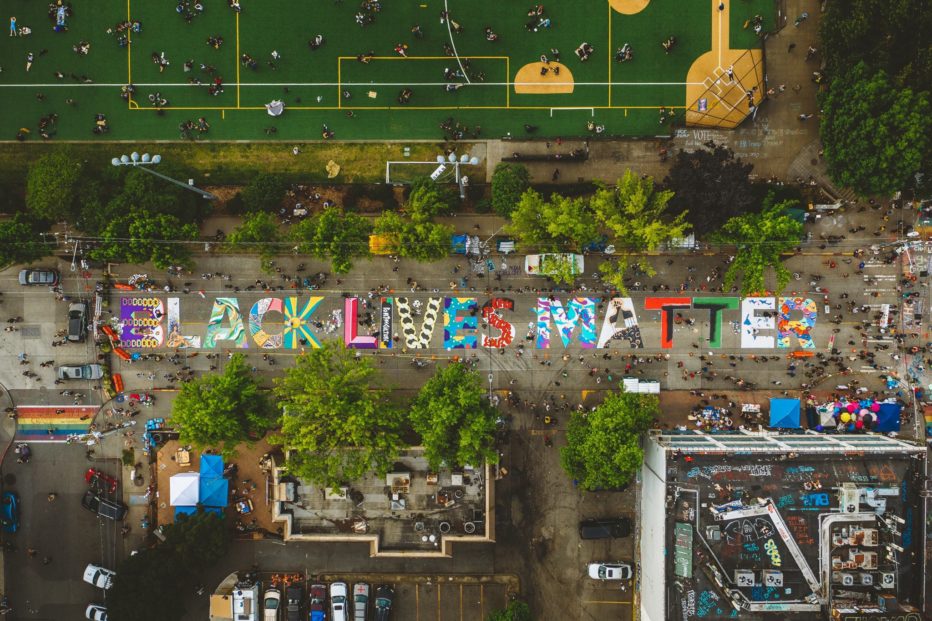Tomorrow is Juneteenth, a day to commemorate the abolition of slavery in the United States—and it is also an opportunity to remember and acknowledge our history. That this country was built on the stolen labor, knowledge, and skills of Black people. That the systemic anti-Black racism that made the institution of slavery possible in the first place is pervasive and persists in American institutions and systems today.
The uprisings happening across the country and here in the Northwest right now are inextricably linked to this history. The Movement for Black Lives’ call for the abolition and defunding of police is in response to this persistence, and the anti-Black racism that is inherent in the institution of policing.
We know what community care and safety truly looks and feels like. Community care looks like easy access to food, housing, education, and well-paying, meaningful work—and it feels like mutual support, healing, connection, and wellness in the fullest sense. And yet, as we have all seen from current conversations around municipal budgets, policing receives prioritization and an incredible amount of funding in local, state and national budgets. The over-funding of policing has come at the cost of under-funding critical social service programs that are better poised to provide support and mutual aid to our communities. This over-investment in policing has also resulted in the proliferation of prisons. Abolishing police is deeply connected to the abolition of prisons—and both are the critical next steps in the full abolition of slavery in this country.
Seeing police abolition and anti-Black racism discussed in mainstream media, in workplaces, and in homes across the country and world has made me hopeful that we are, in fact, on the brink of a sea change in this country. And while meaningful progress requires real, authentic, and difficult conversations, the work cannot just be talking. This is not a moment for rhetoric and gestures—it is a moment for doing, a moment for action, a moment for real systemic change.
Racial justice is not just a piece of our work at Pride Foundation, it fundamentally is our work. We are committed to centering racial justice in all we do. This has culminated in changes to who and how we fund, and our role in the field of philanthropy. As an organization, we are striving every day to become more anti-racist and demonstrate this commitment through our words, our actions, and our work.
The history of our country and the reality of our world in this moment require us always to do more, and do better. We’ve shared our thoughts and reflections with you in past weeks, and here are some ways we are trying to do more, and do better for queer and trans Black, Indigenous, and other People of Color (BIPOC) in our communities
We’ve made significant changes to our Community Grants Program to shorten our application, reduce the burden on applicants, and more intentionally prioritize work led by and centered around queer and trans BIPOC. Although these changes have been in the works for quite some time, in this current moment especially, these changes are responsive to our communities’ needs and reflect Pride Foundation’s mission to center racial justice in our work.
Our Crisis Community Care Fund, which was created in response to COVID-19, will include moving resources to Black-led and centered organizing work around racial justice efforts in the Northwest, as these efforts are addressing the systemic racism that resulted in the disproportionate impact COVID-19 has on Black people and communities.
We’ve been using our institutional voice to be in unwavering solidarity with the people, communities, and movements who are challenging the violence and systemic oppression that undermines the humanity of Black people. We sent an open letter to Seattle Mayor Jenny Durkan, decrying the actions of her office, and those of the Seattle Police Department during the protests that have taken place across the city in the wake of the death of George Floyd. We also have sent letters in coalition with Seattle LGBTQ+ organizations and a letter from 142 LGBTQ organizations nationwide calling to defund the police and invest in communities.
We know this isn’t enough. And we will continue to do more and do better for our communities every single day, listening closely and working in solidarity with queer and trans Black leaders in our communities.
One of my most deeply held beliefs is that change is possible—people can change, institutions can change, systems can change. I believe it to my core and I hope that it will happen. This is why we do this work—it is why we know that justice and liberation are possible. Our work now is to give that hope teeth, and use it to bring transformational change for our communities and our country.
Together, I know it’s possible.
Katie Carter is Pride Foundation CEO.
